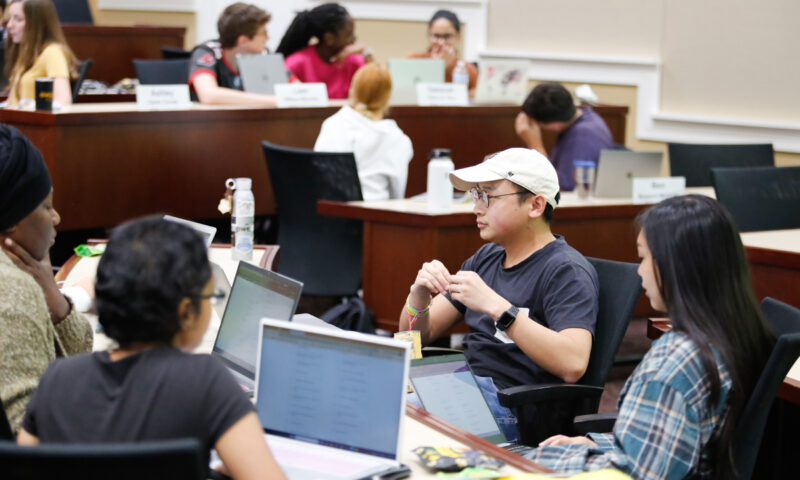By Haleigh Ensminger
Technology skills have essentially become a prerequisite for any job in business. As jobs continue to evolve with the improvement and use of technology, we must acquire the skills to leverage technology to set us apart from others and make our jobs easier each day.
This necessity of understanding technology is one of the reasons that I chose to continue my business and accounting education at McIntire. Classes like Data Management and Analytics for Accountants ensure that all students who graduate from the M.S. in Accounting Program develop sharper skills related to the most fundamental data-driven tools used in business.
Data Management and Analytics for Accountants
This year, Professor Yi Liang taught Data Management and Analytics for Accountants. While data can be tricky for some, Professor Liang worked hard to ensure that the fundamentals were understood to create a solid foundation for students to build from in other classes and their careers. Professor Liang illuminated this course’s vast benefits and relevance to the real world. He said the benefits of this course are “enhancing career development opportunities, CPA exam prep (specifically for BEC), and daily life.” This course will not only make studying for the CPA exams easier, but it will also help us make more informed data-driven decisions in our own lives.
Learning Data Analytics Tools & Software
As a student in this class, you get a lot of experience with various tools and data platforms used in business. Speaking from experience, I know every tool we use in this class I have either used or heard talked about during my previous internships in tax, auditing, and risk assurance. We spent a few weeks focusing on the following: Excel, Alteryx, Tableau, and SQL. The Excel skills learned are the most universally helpful, as Excel is used across all lines of business to perform analysis and organize data. Alteryx and SQL are great tools for data analytics, and these skills are becoming increasingly leveraged across all functions of a business. Tableau is the most creative tool we use. This visual analytics tool transforms data into understandable figures and creates compelling stories.
Application of Skills to the Working World
McIntire recognizes the importance of group work, as it plays an intricate and frequent role in our careers. To build these skills, our two big projects in this course are completed in groups. In the first half of the semester, students completed a project focused on data cleaning, manipulation, and analysis by leveraging Excel and Alteryx. These skills are essential when dealing with large amounts of data, which we can all expect to deal with as we enter the business world. Throughout the second half of the semester, we worked in groups to address an accounting problem by designing, building, and using a practical database.
While I love learning and sharpening my skills, I appreciate seeing the direct carryover these skills will have in my career. Professor Liang mentioned a conversation he had with directors at PwC, which emphasized how being efficient in Excel is crucial. Furthermore, the PwC directors stated that database knowledge (like SQL) and Alteryx are highly sought-after skills. Tableau is widely used, but some Big Four firms use their own visualization tools. However, Professor Liang noted that the overall concepts will still be applicable. He stated, “learning the underlying logic as we do in class is important because it makes learning how to use different software very simple.”
The Possibilities of Data
I asked Professor Liang why he liked teaching Data Management and Analytics for Accountants. He said it is a more advanced version of the courses he taught previously. Additionally, it directly aligns with his research. Professor Liang says his favorite part about data tools is how information technology and information systems can be used, specifically in financial accounting. To my surprise, Professor Liang uses these tools to see how a company’s financial statement disclosures impact the actions of consumers and competitors. Over the past 16 weeks, I have learned about many data tools. I have enjoyed learning how to leverage these tools to advance my career.



